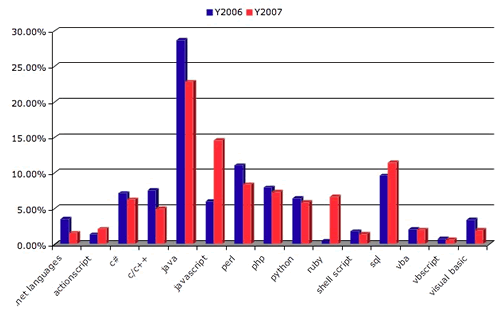I understand Microsoft’s in pitched battle on a number of fronts with Google, but I’m a little surprised to see Microsoft use copyright law as a way to differentiate themselves from the search engine giant.
Thomas C. Rubin, Microsoft’s Associate General Counsel for Copyright, Trademark and Trade Secrets, recently gave a speech to the Association of American Publishers (AAP), a group whose members have resisted Google’s efforts to add text from books in their ever-growing index of stuff. The gist of Rubin’s speech? That Google doesn’t respect copyright, and Google’s actions are designed to aid their own business at the cost of publishers:
I think we can all agree that using the Internet to enhance the market for works is a crucial endeavor and that doing so creates tremendous new opportunities to reach customers. However, the reality, as many of you know, is that authors and publishers often find it difficult just to cover their costs, let alone make a profit, in this new online world. At the same time, companies that create no content of their own, and make money solely on the backs of other people’s content, are raking in billions through advertising revenue and IPOs.
Rhetorically nice, but logically flawed. Rubin’s taking two different facts (the slowing of the publishing industry and Google’s rise) and juxtaposing them in order to make it seem like the two are related. It may be true that publishers face challenges to their business model, partly because of the rise of the internet. It may also be partly due to rising costs of raw materials (like paper), increased competition for personal discretionary spending; the money you and I might spend on books could just as easily be spent on DVDs, games, going to the movies, taking in a concert, or on digital stuff for my iPod. Perhaps publishing is just a lousy business; hit-driven, sensitive to commodity prices, distributed through a complicated supply chain, and increasingly sold through a shrinking number of larger retailers. No wonder it’s galling to see a company like Google (or Microsoft, for that matter) make money hand over fist.
But is Google really as parasitic as Rubin suggests? At the start of his talk, Rubin equates Microsoft to his audience, noting that Microsoft creates its own content. I assume he means software, otherwise he’s loading an awful lot of importance on Microsoft Press. But how, exactly, does Rubin think Google serves up those search results? Or delivers email, lets people blog, lets users create documents and spreadsheets, etc? If Microsoft Windows and Office qualify as content, then surely the software Google writes deserves the same recognition.
Google’s chosen path would no doubt allow it to make more books searchable online more quickly and more cheaply than others, and in the short term this will benefit Google and its users. But the question is, at what long-term cost? In my view, Google has chosen the wrong path for the longer term, because it systematically violates copyright and deprives authors and publishers of an important avenue for monetizing their works. In doing so, it undermines critical incentives to create.
As a rule of thumb, I never trust a lawyer when he definitively states what the law means, so when Rubin says Google “systematically violates copyright,” alarm bells go off. Last I checked, Google Book Search has yet to be ruled a copyright violation. In fact, in my marginally-more-informed-than-the-average-Joe’s understanding of things, it seems that indexing the full text of a book is no different than indexing the full text of a web site, and we all seem to accept that (including, I presume, the members of the AAP).
As for depriving publishers of cash, I fail to see how. Google’s not publishing the full text of books in their index. Their aim is to include books in search results. Google’s publishing partners can elect to show as much or as little of their books in the browsable results as they please. Google won’t display much more than cursory information from works still protected by copyright when the rights holder isn’t one of their partners. In either case, being searchable puts a book’s content in front of a much wider audience than the current distribution model.
How can having their books become part of the source most people turn to when they need information do anything but help publishers?
If any publishers in Rubin’s audience were at all inclined to give Google the benefit of the doubt, he hauled out YouTube in an attempt to scare them back into line:
In essence, Google is saying to you and to other copyright owners: “Trust us – you’re protected. We’ll keep the digital copies secure, we’ll only show snippets, we won’t harm you, we’ll promote you.” But Google’s track record of protecting copyrights in other parts of its business is weak at best. Anyone who visits YouTube, which Google purchased last year, will immediately recognize that it follows a similar cavalier approach to copyright. Since YouTube’s inception, television companies, movie studios and record labels have all complained that the site knowingly tolerates piracy. In the face of YouTube’s refusal to take any effective action, copyright owners have now been forced to resort to litigation. And Google has yet to come up with a plan to restrain the massive infringements on YouTube.
Again, Rubin’s playing fast and loose with facts and logic.
YouTube is a very different beast from Google Book Search. Anyone can submit content to YouTube. Sure enough, some of that content will be submitted by someone other than the author for the purposes of copyright. I call them “fans,” Viacom probably calls them “pirates.” Google Book Search, on the other hand, requires submitters to verify that they have the authority to proffer the work in question to be indexed.
Rubin also overstates his YouTube case. YouTube has a wealth of authorized content, submitted by owners like the NHL, CBS, and NBC. It’s a platform; it can be used properly, for the benefit of all, but it can also be used illegally. Sort of the same way Windows can and Windows Media can be used to build legitimate digital content services, as well as providing the infrastructure for a massive black market in file sharing. I would hate to think that Microsoft’s own legal staff has adopted the position that just because a platform can be used improperly, it should be assumed that any use of it is illegal.
The problems publishers face are a result of many factors, including their business model coming into conflict with technological change. Any time a lawyer steps up to say that the law protects your industry from technological change, though, beware. That line of reasoning always yields results that are bad for the customer, bad for technology companies, and ultimately won’t protect the industry facing these challenges.
What’s more, I’m disappointed with Microsoft’s use of this forum. They’re a world-class technology company. Surely they have some concrete solutions to offer the members of the AAP? This was an ideal opportunity for Microsoft to get in front of a multi-billion-dollar industry and demonstrate how they could help grow that business. After all, Google’s having a hard time making its case with these people, but the pub
lishing industry recognizes that they can’t stand still in the face of increasing digitization. Unfortunately, Microsoft sent a lawyer to do a man’s job. Save for a few warmed-over nods to Microsoft’s book search project, there was nothing besides anti-Google FUD on the menu today. Publishers didn’t get anything they could use to reinvigorate their industry online, and Microsoft gets a swarm of blog posts like mine.
What a pity.

 Seven week old
Seven week old 